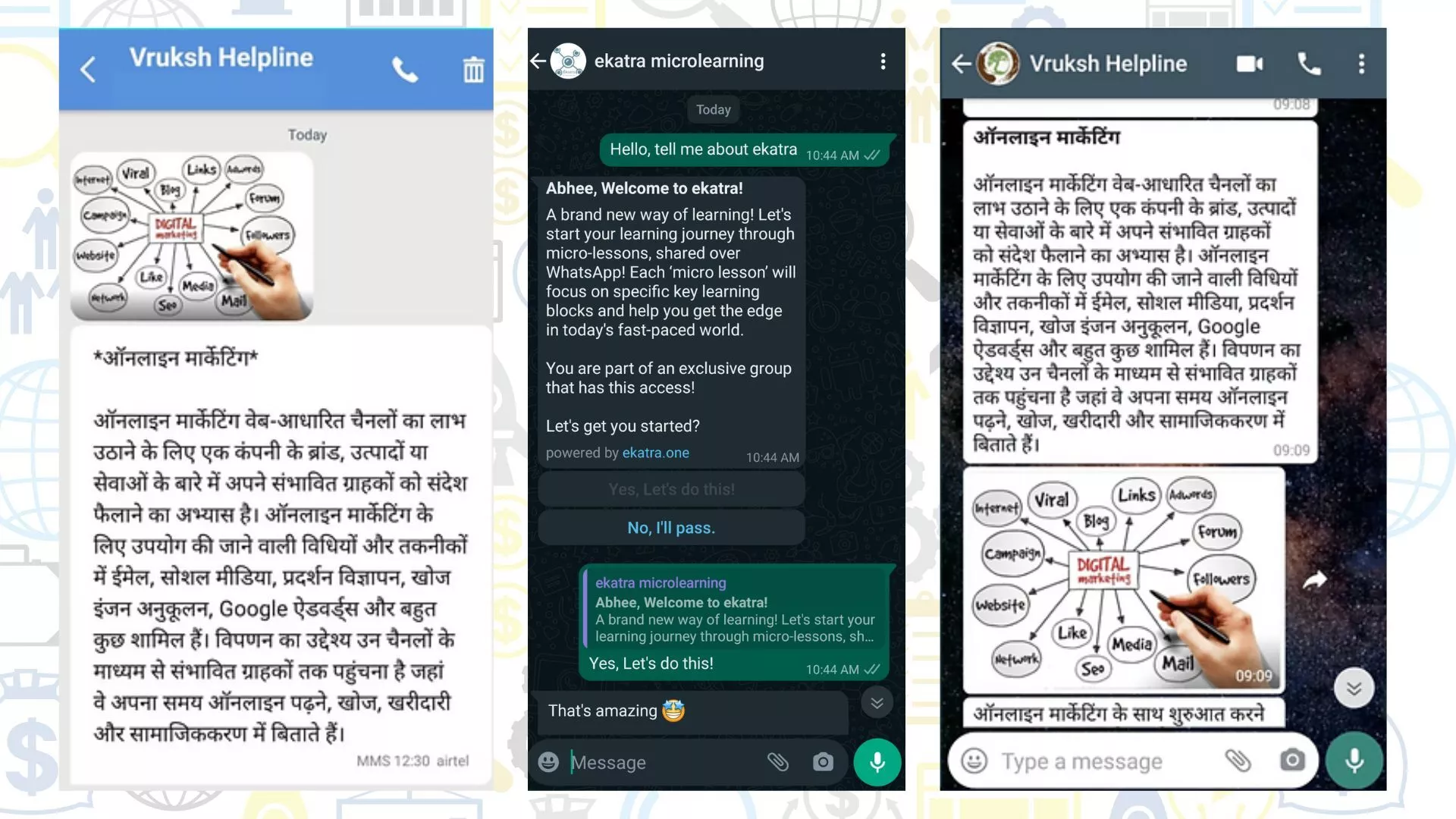A Nexus-trained start-up uses text messages and WhatsApp to bridge the digital divide.
February 2023

Ekatra combines the power of text SMS, WhatsApp and audiovisual communication to increase access to entrepreneurship education. (Screenshots courtesy Abheejit)
More than 60 percent of the Indian population lives in rural areas, where internet density is lower than urban regions. This digital divide is a major challenge in ensuring equal access to online education. To help address this, a Maharashtra-based start-up developed a low data learning tool, Ekatra, that combines text messages, audio and video to increase access to learning and training. The start-up’s founder and CEO, Abheejit, was part of the 14th cohort in the U.S. Embassy’s Nexus Start-Up Hub.
Excerpts from an interview with Abheejit.
Why and how did you come up with this platform?
I launched my nonprofit, Vruksh Ecosystem, in 2018 which focuses on providing entrepreneurship education to underserved communities in semi-urban or rural areas in Maharashtra.
The COVID-19 pandemic highlighted the digital divide, and our team noticed the same trends with our students. When the team tried moving our content delivery online post-lockdown, only 5 percent of the students were able to attend sessions through video conferencing tools like Zoom or Google Meet. Even when we moved to WhatsApp, an almost ubiquitous platform in India, only around 50 percent of the students would show up. The team also faced some unexpected issues. For instance, we started getting messages from students saying that they won’t be able to attend classes from the next day as their internet data pack was ending.
Vruksh’s team then decided to move to audio conferencing as a solution. However, no single existing tool allowed the team to reach more than 100 students on a single call. Our solution was to buy a number of different services and build a single tool called Ekatra, which allowed us to connect with more than 200 people on a single audio call. On Ekatra, only the educator would be on a web or online tool, while the students could dial in from regular phones. Additionally, it also allowed delivery of educational content via WhatsApp messages and SMSs. With the launch of Ekatra, the team was quickly able to reach up to 80 percent of the original student base.
How does the platform work?
For a simple breakdown of how Ekatra works, the teacher uploads the course content onto the Ekatra platform, adds the students and schedules the delivery. The students get a notification to begin their daily coursework, which starts a series of interactive learning paths that typically take under 15 minutes to complete. The students receive the content as a combination of text, image, audio and video for a media-rich learning experience, all at their own pace and time. They can then discuss the topic with their teacher and peers over a conference-style audio call.
Which careers are students being prepared for?
We provide primarily entrepreneurship education. The skills that students learn include leadership, critical thinking and financial accounting. The team is also working with over 30 organizations across domains to provide education on other topics.
Where are Ekatra users based and what is their feedback?
We currently have a global footprint of about 18,000 young and middle-aged learners, with most users from India. Currently the language of instruction is English, Hindi and Marathi. The platform does not have limitations on the languages in which the content can be distributed. We are working with some partners in Africa to develop content in Swahili. Our users have loved the experience and have benefited primarily because of the simple and easy access Ekatra provides to them.
How is the platform increasing career readiness and improving access to livelihoods?
The platform is increasing career readiness by providing learners with access to the latest skills and knowledge related to their career goals. It is enabling access to livelihoods by providing learners with the opportunity to learn new skills and acquire certifications that are beneficial to their entrepreneurial aspirations. Most people who have benefited from our entrepreneurship education have never had formal training in running a business. Additionally, we hope to connect the learners with mentors and peers in their respective domains, which will help them to stay up-to-date with the latest trends in their field. This helps them to become more competitive in the job market and gain access to better job opportunities.
Jason Chiang is a freelance writer based in Silver Lake, Los Angeles.
COMMENTS